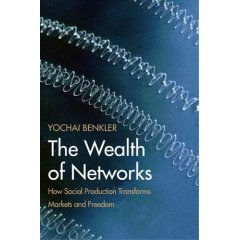On Thursday, Russ Newman of Free Press and Susie Lindsay of the Berkman Center presented as part of the UMASS Lowell’sNew Directions luncheon series. The series is designed to bring thinkers and practitioners in the fields of new media and technology to the Lowell community. This particular presentation wrapped up the 2005-2006 series.
Both speakers provided great background and activity in the realm of communication’s policy and participants were enaged in disucssing some of the key point highlighted.
For me, one of the most valauable insights came from Susie Lindsay and how she defined the various ages of “television” (broadcast, cable, Internet) and their varying value priorities. I’ve misplaced my notebook for the time being and with it the specifics of what the values in each era are. But the key thought was the idea that current communication battles are reflective of these clash of values (i.e; universal access vs. innovation).
I have thought for a while that the variety of regulatory environments (which I would also include telephony and sattelite) each brought with it a separate set of business practices and public give backs that have been embedded in the ways companies, communities and indivdiuals have come to expect and experience their variety of communication services.
Looking at these battles from a value perspective helped me in attaching language to thoughts I’ve had for some time. Thanks Susie.

